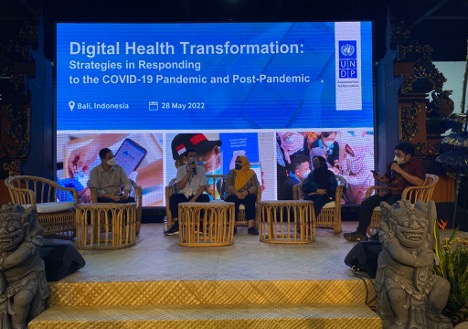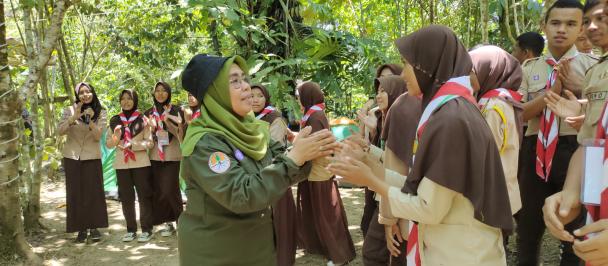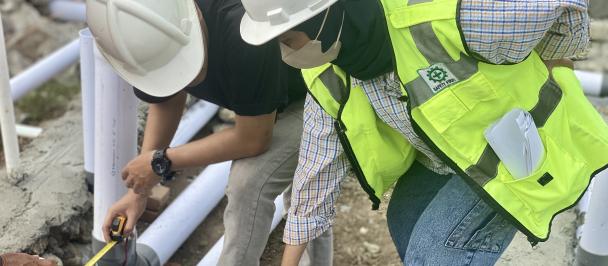Indonesia’s path on digital health transformation puts on spotlight at GPDRR 7
June 29, 2022

Bali, Indonesia - The COVID-19 pandemic has accelerated Indonesia’s transition towards digital health care and more opportunities in digitalisation abound, according to panellists of a discussion hosted by the United Nations Development Programme (UNDP) and Indonesia’s Ministry of Health (MoH) at the 7th Global Platform for Disaster Risk Reduction (GPDRR) 2022.
The discussion took place at Indonesia Resilience House (Rumah Resiliensi Indonesia or RRI) in late May as a side event of the GPDRR, organised by the United Nations Office for Disaster Risk Reduction (UNDRR), in Bali.
Entitled ‘From Risk to Resilience: Towards Sustainable Development for All in a COVID-19-Transformed World’,this year’s forum, provided a platform to share knowledge and discuss best practices to reduce disaster risk. Indonesia’s participation as the host nation tapped into the theme of ‘Strengthening Partnership Towards Sustainable Resilience’ and focused on the COVID-19 pandemic’s impact on the conventional understanding of risk and disaster risk governance.

UNDP and MoH shared expertise on the ‘Digital Health Transformation; Strategies in Responding to the COVID-19 Pandemic and Post-Pandemic’ talk show at the 7th GPDRR’s RRI event held in Bali.
Opening the session, Setiaji, Expert Staff at the Ministry of Health in Health Technology and Chief of Digital Transformation Office (DTO), explored the disruptive approach of digital health transformation. He highlighted the development of the PeduliLindungi application as part of the national response to the COVID-19 pandemic and its focus on tracking the number of COVID positive cases nationwide. He also outlined the MoH’s priorities in health technology which focus on integrating the health data system, and the health care application system; as well as developing a health technology ecosystem.
Agus Soetianto,Head of Health Governance Initiative Unit at UNDP Indonesia shared highlights of the Sistem Monitoring Informasi Logistik Secara Elektronik (SMILE) application. A joint effort between UNDP and MoH, SMILE was developed to track vaccine cold chains, but was expanded during the pandemic to manage the distribution of COVID-19 vaccine across the archipelago. SMILE is now being used in conjunction with the MoH’s Aplikasi Sehat IndonesiaKu (ASIK) system, to ensure efficient delivery of routine vaccines.
Members of the TB and ISPA Working Group, Ministry of Health, Alfinella Izhar Iswandi, and Krisna N.A. Pangesti said that the government also prioritises the strengthening of national laboratory networks sequencing for infectious disease surveillance and viral mutation detection. They believe that such efforts are critical for the national pandemic preparation architecture to avert future calamities.
The speakers concluded that the national COVID-19 Recovery/Resilience Strategy should involve digital health transformation, national pandemic preparedness framework and, fostering collaboration through multi-sectoral partnership for a more transformative post-pandemic recovery.
To watch the talk show, visit BNPB’s video or see below.
***
Written by Virgi Fatmawati, UNDP Indonesia, Knowledge Management and Learning
Edited by Tomi Soetjipto and Ranjit Jose

 Locations
Locations

